The benefits of sleeping with music on
It's no secret that the internet is full of relaxing sleep music. They're typically instrumental tracks, lo-fi beats, sounds from nature, or some combination of all of them. And, to an extent, there is science to back up their title as sleep music.
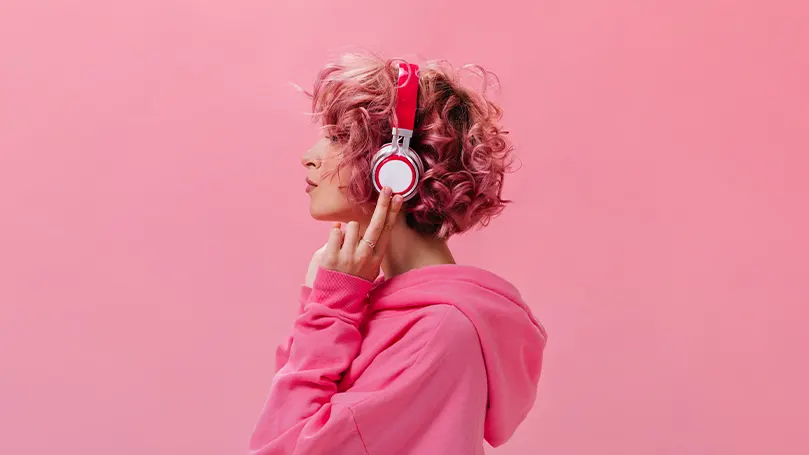
Firstly, music can affect sleep through your actual heartbeat. This is because songs that have around 60 beats per minute can cause your brain and heart rate to synchronise with the beat and allow you to fall asleep faster. However, it's important to note that this is tied to the beats per minute or the tempo.
So, even classical music isn't going to be much help if it's really fast. So, something like Vivaldi's Spring, which clocks out at around 113 BPM, isn't going to necessarily help you fall asleep in this manner. That being said, this isn't the only way in which music can help you get a good night's sleep.
The impact of music on your mental health
If you've ever jammed out in your bedroom with a fake microphone and your favourite song blaring on the speakers, you know that music triggers plenty of happiness when you get into it. And in the long run, playing music that makes you feel this way helps out immensely.
This is because music can help you deal with stress and completely change your attitude. And this doesn't just refer to pop music. Even heavy metal, which is heavily stereotyped by people outside of their community, sparks joy in the brain and helps us remain happy!

And if you're happy during the day, you're a lot more likely to be happy during the evening. In turn, being happy during the evening can help you fall asleep a lot more quickly! This is because how stress affects sleep and sometimes even triggers certain sleep disorders.
This is also research suggests that music therapy might be an effective way to fight against insomnia. So, listening to music definitely seems like an ideal bedtime routine for now.
How music helps create a sleep routine
Although this benefit is a bit more fringe than the previous example, it's still worth pointing out. We've talked at length about how an optimal bedtime routine can fix your sleep efficiency and nab you consistent rest.
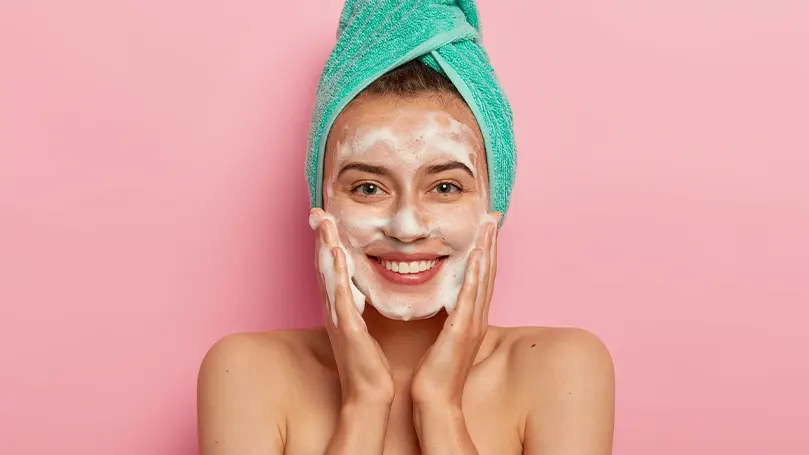
And the reasoning is pretty simple – if you play the same music every night, your body will start getting used to it and in turn “fall asleep on cue”. This is simply due to the fact that your mind will associate those songs with sleep and will therefore be prompted to make you sleepy every time you hear them. Just make sure not to Pavlov yourself with extremely popular songs or you might just fall asleep while out in the town.
Jokes aside, creating your own playlist with calming music that you like can help create a habit and subsequently help you fall asleep a bit faster. Just make sure that you don't get sick of hearing the same song every night.
Sleeping with music drowns out other noises
Another big convenience of having music on is that you're unlikely to hear anything else. For example, if you've ever had noisy neighbours, you know that even them just walking around can keep you awake for hours.
However, if you have background music to listen to, their movements will likely be harder to pick out and thus less annoying. That being said, make sure you're not the noisy neighbour in this situation who's keeping someone else awake with your music.
The two-way relationship between sleep and music
Lastly, we'd like to talk about a rather interesting fact – that music can affect your dreams. In a study called Music and Dreams, it was determined that those who listened to music, sang, or plaid an instrument during the day and their childhood were more likely to have music in their dreams as well.
And this is especially fascinating when it comes to musicians as there are plenty of examples of famous composers and songwriters being inspired by a dream they had. So, interacting with music while you're awake makes it so that music is more frequent in your dreams, which can then potentially help you come up with new music. Talk about a positive cycle!
Are there any risks to sleeping with music on?
So far we've only focused on the positives. And realistically, we're sure that for a lot of you, the positive effects are the only ones you're ever going to experience. That being said, since the odds of these risks are higher than zero, we believe pointing them out is still necessary.
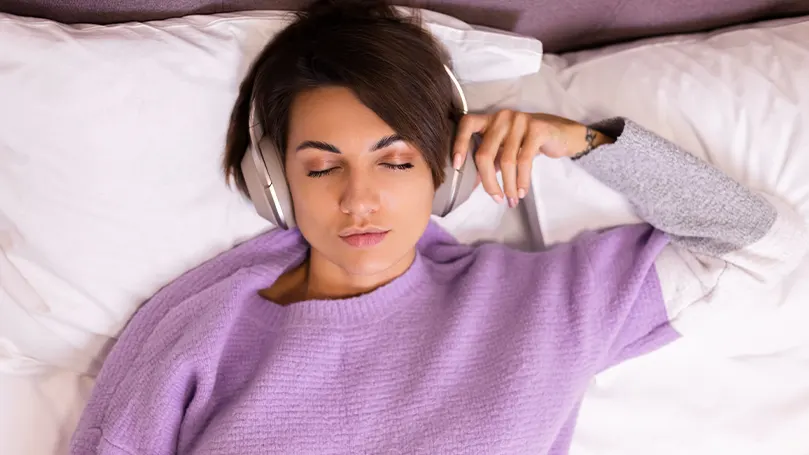
Ruining your sleep quality
Although this contradicts everything we've said so far, it's true in some specific scenarios. Firstly, if you're playing your favourite song while you're trying to go to sleep, you're probably not going to have a lot of luck. This is because if the song has lyrics, you're likely going to feel tempted to sing along.
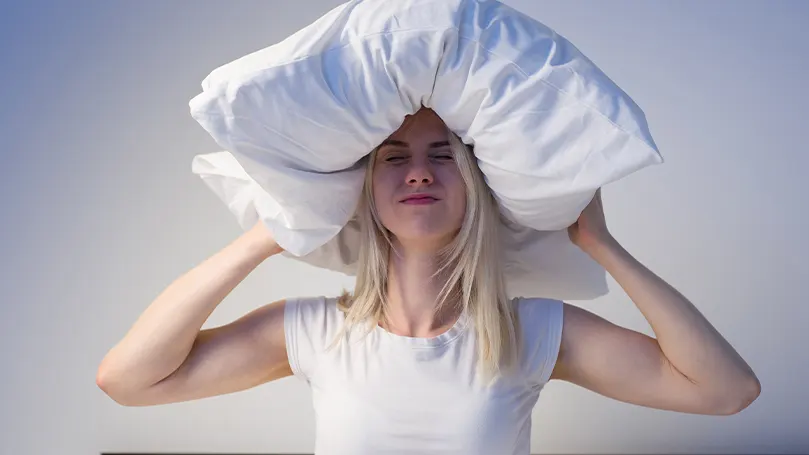
And as you could imagine, neither karaoke nor singalongs are all that helpful when trying to fall asleep. Secondly, music doesn't always have to bring forth positive emotions. For example, if you run into a song that reminds you of an unpleasant part of your life, you're likely going to dwell on it for a bit.
Lastly, if you put your playlist to shuffle, you might just scare yourself. For example, if a really loud or aggressive song starts playing while you're still in the N1 or N2 phase of sleep, you might just jolt out of bed in fear. This has nothing to do with the music genre but rather how loud it is.
The dangers of wearing earbuds in bed
While all of these points are invalid if you simply play the music on a speaker, earbuds do come with a few potential issues. After all, they're spending the entire night in your ear. So, let's go from the least to the most dangerous potential situation.
The least dangerous outcome is that you roll over in your bed and accidentally damage some part of your ear canal with the earbud. It's not very likely and most earbuds were designed to avoid this exact situation but it's technically possible.
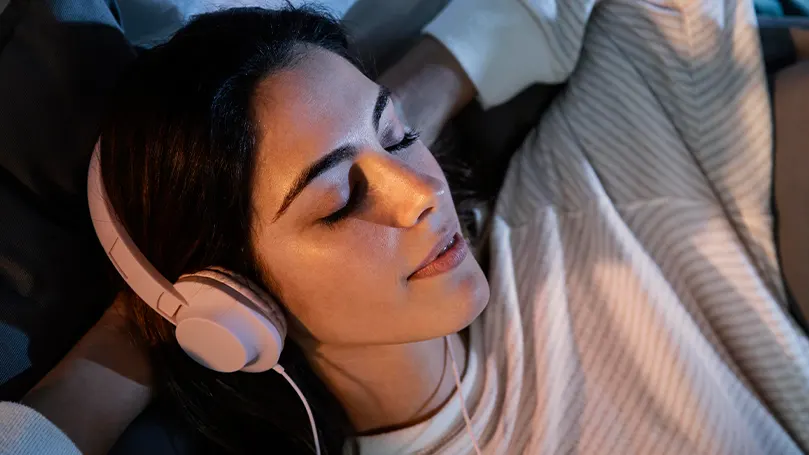
In second place, if you keep your earbuds in for a very long time, earwax could start building up potentially leading to complications down the road. Again, this isn't very likely but it's still possible.
Lastly, if you're using regular headphones, the cord can get wrapped around your neck and suffocate you in your sleep. However, this isn't the case with more modern wireless earbuds. And it's also not too likely to happen but you should keep it in mind if you have very young children.
Conclusion
So, is playing music a viable alternative to seeing a sleep doctor? No. However, we think that it's a lot more likely to help you fall asleep quickly and efficiently than it is to harm you in any way. Just remember to seek out music at around 60 bpm that you enjoy listening to and keep on jamming out in your dreams!

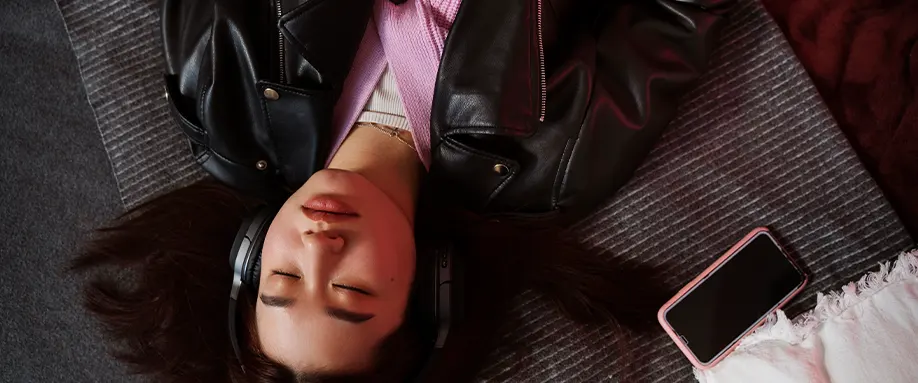











There are no comments yet
"*" indicates required fields